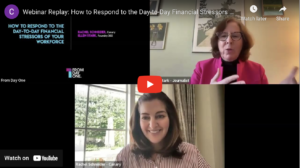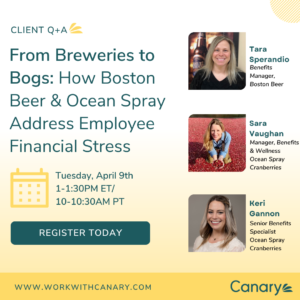Updated: Aug 7, 2020

Canary and the Red Tab Foundation (RTF), a nonprofit that provides a safety net for Levi Strauss & Co. (LS&Co.) employees and retirees, have partnered to innovate on providing critical aid to workers experiencing financial hardship. We sat down with Jenny Calvert Rodriguez, Executive Director of the Red Tab Foundation, to discuss our partnership and how it is beneficial for LS&Co. employees.
Canary: How do you think about the company’s role in helping people deal with financial hardships? How do you think people who work at your company think about helping each other? Why does this matter?

Rodriguez: RTF exists because doing the right thing is a core value at LS&Co. As a long time leader in this space we have seen first-hand that when we support and put employees first, entire households and broader communities all benefit.
Our founder, Jerry O’Shea, started out as a stock boy and retired as a VP. He wanted to make sure that people who worked for the company were cared for, particularly the manufacturing workers who spent their whole careers sewing our iconic products. RTF is primarily funded by donations from employees along with the descendants of Levi Strauss and Board members.
What made you want to explore a solution like Canary?
As LS&Co.’s part-time workforce grew, RTF started seeing that there were a lot of emergencies that could have been addressed more economically and with way less stress for the employees, if they had been handled earlier.
We thought Canary could help expand our traditional safety net model to address hardships earlier, before they become a crisis. What excited me most about the Grant Circle is how much more efficient it is at gathering information than our normal process, which helps people get funds quickly. The Canary team is laser-focused on user experience; the product is thoughtfully designed and gathers the right information without making people feel overwhelmed when they apply.
What kinds of financial challenges do employees at your company experience?
Triggers for financial hardships come in many forms. The most common are loss of income due to unpaid time off, or large, unexpected expenses. An employee or someone in their household may be injured or ill and their local government or company policies don’t provide ways to keep getting paid in that situation. But especially for part-time workers, their budgets are so tight that sometimes it just takes a small incident – a parking ticket or a medical bill – and then all of a sudden employees can’t pay their rent.
It can be hard to trace that back to a specific event – usually there are several factors compounding. But regardless of how someone got there, we have a policy that we’re not going to let anybody be homeless on our watch.
How do you think a hardship fund plays alongside the wages and benefits of what Levi Strauss & Co. is providing? Why not just rely on paying people more?
LS&Co. has made a lot of strides to support employees, including paid sick leave for part-time employees and paid family leave to care for loved ones. So those things are very important in ensuring that employees can weather unexpected events. But income doesn’t directly relate to the ability to handle an unexpected situation. We see employees making good salaries come to us for help. Making it purely an income calculation misses a lot of the nuance and complexity about people’s financial lives.
One of the great things about this model is how it can address inevitable gaps in how even well-designed policies play out. Policies are broad, after all, but hardship assistance is personal and specific. For a global company, sometimes it’s hard to see how the policy you just put together is actually manifesting in people’s lives. So one role that we play at RTF is to keep an ear to the ground and help inform LS&Co,’s thinking about wages and benefits.
What results did you see through piloting the Grant Circle with Canary?
By making our application process more user friendly, the Grant Circle is helping us do what we always do but more effectively. Sometimes it just takes too long to get the cash out the door in our normal process – due to documentation requirements and other factors. It shouldn’t take the same level of scrutiny to give out $200 as it does $2,000.
We learned how to improve the application experience for our clients. Like, how to ask questions in a way that gets at the employee’s situation, without overwhelming the applicant. Doing a pilot gave us the ability to learn before we jumped in full-force and overhauled our whole application process.
We began our pilot in New York City due to the density of stores we have there. But especially now, as the city has been so highly impacted by COVID-19, it feels even more important to have chosen that location. We have employees who have been furloughed, and the market will be one of the last places to re-open stores. Canary is helping us get out funds quickly to people who need it the most.
What makes working with Canary special?
The amount of thought partnership as we’ve worked through real situations and cases together with the Canary staff. With many vendors, you have to try to explain the problem that you’re trying to solve, and they don’t understand it. With Canary, there are so many years of experience understanding people’s financial lives. I’m learning a lot just by listening to how they’re thinking through challenges that we share.
What would you say to other employers who are looking to help their employees in times of financial hardship?
Number one: You’ve got to keep your employees front and center and respect their agency and dignity. People’s financial lives are complex, and asking for help is hard. But the benefits for all involved are significant. The real value of a hardship fund is giving your workforce the tangible, human sense that their employer has their back in a difficult time. And when that’s true, it has a substantial positive impact on the culture of your company and the ability of your teams to be their best selves at work.
———
Thank you to Jenny Calvert Rodriguez and the whole RTF team for their example and commitment to supporting worker financial health. If you want to learn more about partnering with Canary, we invite you to explore our website and get in touch.






